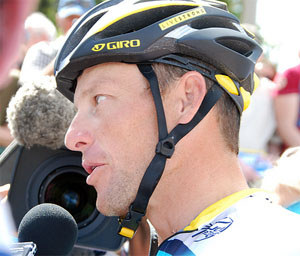Lance Armstrong becomes cycling's prince charming
 Adelaide, Australia - Lance Armstrong has a lot to be immodest about: champion triathlete in his schooldays, world road racing champion at 21, seven Tour de France victories before retiring in 2005 and, most amazing of all, surviving cancer surgery in 1996 that doctors thought would kill him.
Adelaide, Australia - Lance Armstrong has a lot to be immodest about: champion triathlete in his schooldays, world road racing champion at 21, seven Tour de France victories before retiring in 2005 and, most amazing of all, surviving cancer surgery in 1996 that doctors thought would kill him.
Yet modesty was the great man's hallmark in his comeback appearance in Australia's Tour Down Under.
Out of yellow, the 37-year-old Texan was surprisingly mellow, surprisingly accessible, and surprisingly candid.
"I just didn't have the firepower to keep it going." Armstrong said after finishing the Australian six-day classic in 29th position, 49 seconds behind a winner that many cycling fans hadn't heard of.
Armstrong was relating what happened on the last kilometres of the last day of the Adelaide event when it seemed possible that he could catch the breakaway, win the sprint, and make a fairytale return to racing.
A roar went up when he hit the front of the peloton. Such is the legend, it was impossible for fans not to imagine him bridging the gap and being on the podium once more day.
Not winning was probably quite a mental leap for Armstrong himself.
"In a lot of ways I was born to race the bike," he said in Adelaide. "From the day I showed up for professional cycling, I was winning bike races. I've been here for a long time."
And for a long time, fans and the press alike had got used to a sometimes surly Armstrong, a man with a mean streak who didn't like criticism and was dismissive of the competition.
The Adelaide Armstrong was quite different. He was even remorseful about his past behaviour.
"I can look at my career, my relationship with the press, my relationship with the fans, with the peloton, and you reassess those," he said. "You think, if I could do it again, I'd do this, this and this."
Commentator Phil Liggett reckons the charm offensive is about generating publicity for Armstrong's cancer crusade.
"It's a whole different attitude now," Liggett said. "He now wants something from us."
What must have chastened the Texan is the reality of starting again. He's hoping to line up for the Tour de France in July, but is not assured of a place or even of being Team Astana's lead rider.
Astana head Johan Bruyneel, who mentored Armstrong through his seven Tour de France wins, is noncommittal about what the future holds.
"There are still question marks," Bruyneel said. "We don't know how good he really can be when he is at the top of his level and how good his top level can be when compared to what it was before."
As Armstrong has said, he's working with a "new cookbook" and will not focus solely on the Tour de France as he did in the past. Mid-February will see him start in the Tour of California, where he will be a support rider for fellow American Levi Leipheimer.
The big question this year is whether Astana star Alberto Contador, the 2007 Tour de France winner, will be relaxed at having Armstrong on the team.
The lore in stage racing is that it's a team sport and individual work for the rider most likely to win. Armstrong may have mellowed, but some find it hard to visualize the world's best-ever cyclist dropping back to the team car to fetch a drink for Spain's Contador.
Before the Adelaide race Armstrong confessed to fearing that he would be the first rider dropped from the peloton. Not finishing the six-day race was a possibility.
While there were flashes of vintage Armstrong, the longed-for breakaway on the hilliest stage did not materialize.
"I didn't have the required punch to make a difference," he admitted. "I was glad when the climb was over on a full effort."
The legend, though not burnished, was not tarnished.
Adelaide's is an easy stage race, too short for Armstrong's legendary endurance to come into play and where he couldn't show off his time-trialling skills and his ability to ride one gruelling mountain stage after another.
Bruyneel, for one, was impressed. "It's clear that the comeback was not just a crazy idea," he said. (dpa)